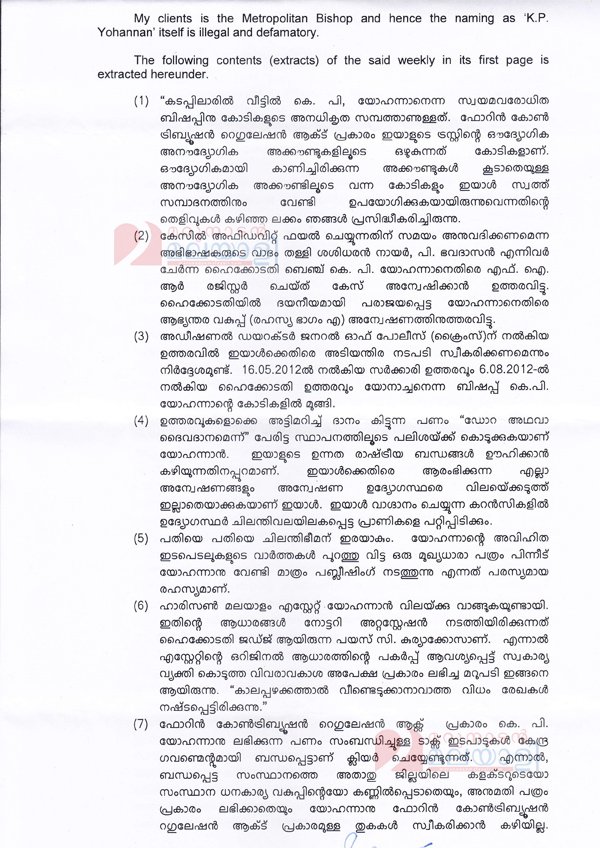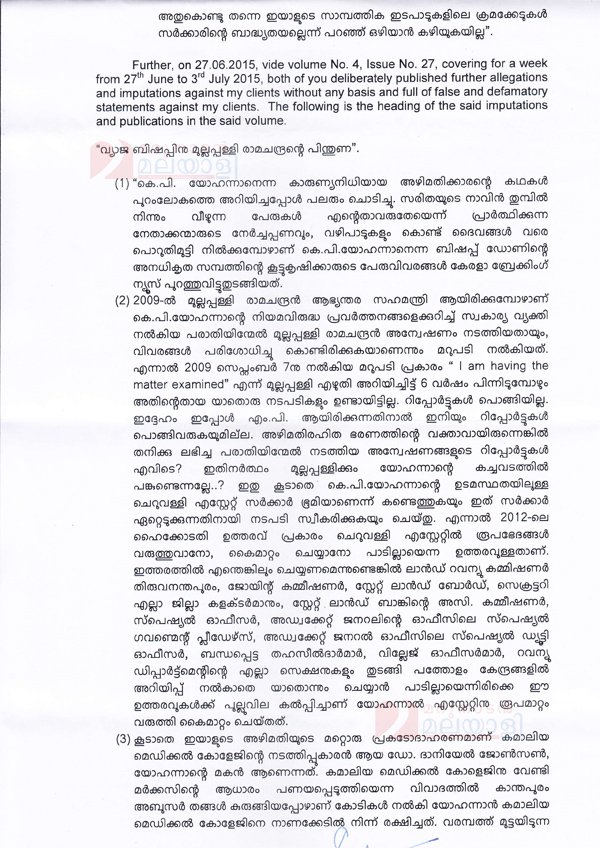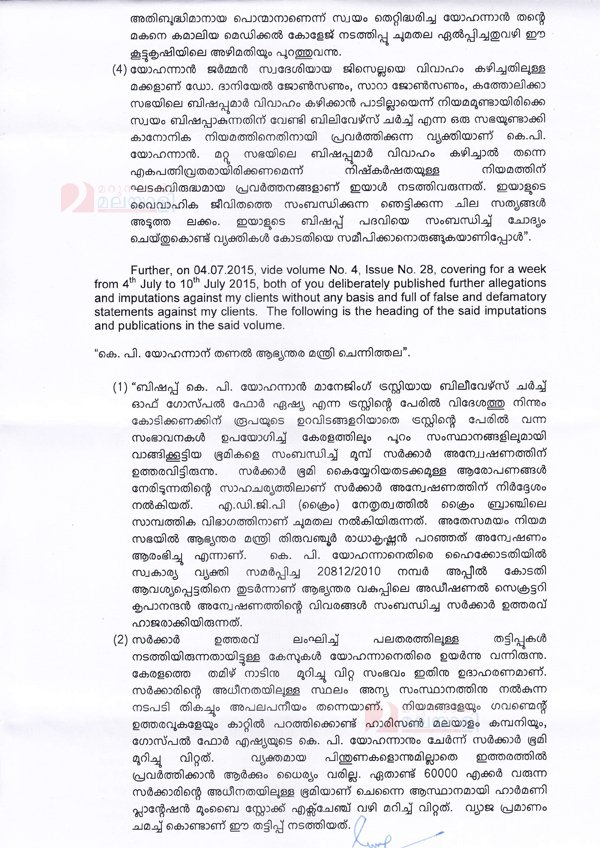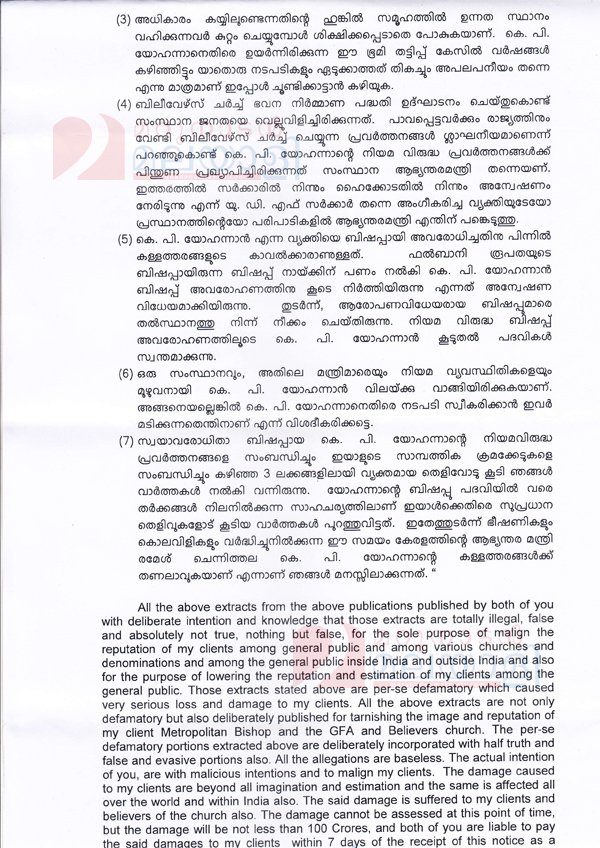This seems like an odd way to evangelize.
I can’t read the Malayalam but the English indicates that GFA-India and Believers’ Church are threatening (or have filed, I can’t tell for sure) a defamation suit against a paper in Kerala India (“Breaking News Weekly”). If this is accurate, GFA-India and Believers’ Church are demanding $15.7 million for defamation which includes calling K.P. Yohannan by his name instead of referring to him as Metropolitan Bishop.
I am seeking a translation but for now here is the “legal notice” according to the paper.


Note that the letter says calling K.P. Yohannan by his name is defamation. He apparently is to be addressed as Metropolitan Bishop. The next two pages pull out Malayalam passages from the paper which GFA/Believers’ Church believe to be defamation. Here is page three and four. Page five is below.



This is all that was provided by the Indian newspaper. The amount demanded in U.S. dollars is $15.7 million (100 Crores). The lawyer wants that sum in 7 days.
If this is true, it won’t be the first time GFA/Believers Church have sued in India. You can use this website to read cases where GFA has been sued and has sued various parties in India.
Month: July 2015
Why the Aitken Bible Story is So Important to Glenn Beck and David Barton
Reinventing the Aitken Bible story is very important to Glenn Beck and David Barton. America as a covenant nation is important for different reasons for both men and the myth of Congress printing the Bible fits right in to their world view. However, as has been shown many times, the story is not what they make it out to be.
In his recent talk to Fellowship Church, Glenn Beck began his false narrative about Aitken’s Bible by shouting, “Don’t let anybody tell you we are not a Christian nation because are absolutely a Christian nation!” Then he incorrectly told the audience that Congress printed the first English language Bible in America. He ended the story by repeating the assertion that the U.S. is a Christian nation.
In a recent talk to Osborne Baptist Church, David Barton again implied that Congress wanted the Aitken Bible used in schools. Watch:
Barton finished his story about Aitken by saying.
The first English Bible was done in 1782, its got Congressional endorsement and its done for the use of schools? I thought the Founding Fathers didn’t want the Bible in schools. See, if you don’t know your history, you put up with policies you should never put up with. When you know your history, you have a different view of what public policy should be.
The point for both Barton and Beck is to influence people to think about America’s founding as a foundation for public policy now. Barton wants the Bible in schools so he makes up a story where Congress printed/endorsed (he has told the story both ways) a Bible for the use of schools. If the men who wrote the Constitution wanted the Bible in schools then it has to be Constitutional for the Bible to be used in schools now.
If the story is told straight then it isn’t as useful. It certainly could support the idea that the founders were friendly toward religion, but it doesn’t say anything about federal policy toward Bible reading in schools. If the rest of the story is told, then it isn’t as useful either. Aitken wanted Congress to appoint him as the official Bible printer, but Congress declined. He wanted his Bible to be the authorized Bible for the new republic, but Congress declined. Furthermore, Congress didn’t put a nickel of tax payer funding into the project.
When listening to either Beck or Barton speak, be aware that the history lessons may not be completely true and that the real object is to persuade you to believe something that isn’t true so you will do something you might not otherwise do.
Glenn Beck, Raoul Wallenberg, and the Mysterious Russian Soldier: Embellishing an Already Great Story
Glenn Beck used a lot of artifacts to tell his stories during his July 5, 2015 talk at Fellowship Church in the Fort Worth are. Previously, I have commented on his false account of the Aitken Bible story and his theological statement that America is a covenant nation. Today, I want to comment on his story about Raoul Wallenberg. First, listen to what Glenn Beck said about Wallenberg.
[youtube]https://youtu.be/aeX_-Vwid_8[/youtube]
Transcript:
This is a document from Raoul Wallenberg. Raoul Wallenberg is one of my heroes. He was a Swedish emissary at the embassy during the 2nd World War and he tried to stand up for the Jews. This is a passport.
His King told him, ‘don’t do this, we have enough trouble, please don’t do this, we have enough trouble.’ But he was in Budapest and he saw what was happening to the Jews and he stood up.
And he would go to the train cars where they had taken all the Jews and he would take these, a handful of them and stuff them between the slats of the train while standing on top of the train and then he’d finally give them in and say everybody take one of these, quickly take one, and he would say, ‘Stop! Stop the train! You have the wrong people, you have my citizens in there! He saved thousands.
This is one of the last ones that he wrote, the woman he wrote it for begged him to leave; he wouldn’t. He said, ‘the Russians couldn’t be as bad as the Germans, and the Russians were right around the corner. He was last seen running into the arms of the Russian military. This is a cigarette case that was carried by one of those soldiers that he ran into the arms of. One of the first troops that came in. Wallenberg ran up to them and begged them for help, ‘help, help me save the Jews, help me save, stop this insanity. What’s on this cigarette case in Russian is carved, ‘Let’s kill all of the Jews and go home.’
Anti-semitism, hatred, racism is a human disease. We must look for the answers outside of the human race. We must look for the answers in God and Jesus Christ.
This story didn’t sound quite right. The part about Wallenberg saving Jews is right but the cigarette case component seemed like an embellishment. How would anyone know that about the cigarette case? Wallenberg disappeared after the liberation of Budapest and was never seen as a free man in public. He left behind no written accounts.
Curious about it, I contacted the Raoul Wallenberg Committee of the United States. Diane Blake is Director of Research and former Vice Chairman of The Raoul Wallenberg Committee. She graciously agreed to watch and evaluate Beck’s clip. Her initial assessment is as follows:
I have never heard anything about a Russian soldier with a hateful cigarette case. I doubt that it is true. I do know that Raoul had the support of the Swedish king and Swedish government when he went to Budapest. When the United States formed the War Refugee Board, they were looking for a Christian from a neutral country to go to Budapest and try to save the last intact Jewish community in Europe. They approached Sweden and Sweden agreed and Raoul was chosen.
Raoul certainly did not give himself up to Russian soldiers, pleading for help for the Jews. Raoul got into the car with two Russian soldiers because he had an appointment with Marshal Malinovsky in Debrecen to discuss the next steps for Hungary, i.e., the search for missing persons and the reuniting of families, emergency food distribution, help with housing, etc.
Blake’s assessment of the Swedish king agrees the sources I can find on the subject. If Beck has a source where Gustav V actually spoke to Wallenberg and asked him not to go to Budapest, I would like to see it. King Gustav actually intervened with the Hungarian regime to stop the deportation of Hungarian Jews to death camps. The Swedes were already involved in trying to save Jews in Hungary before Wallenberg was selected for his mission. Beck’s comment about the Swedish king certainly seems like an unnecessary embellishment.
Beck’s story of the cigarette case doesn’t add anything substantial to the story except it gave him an opportunity to show off another collector’s item. According to Blake, Wallenberg was taken into custody and never seen again.
On January 17, 1945, somewhere en route to Marshal Malinovsky’s headquarters, Raoul and his driver (Vilmos Langfelder) were handed over to the NKVD. By the first week of February, 1945, they were in separate cells in Moscow’s Lubianka Prison. Raoul was never seen as a free man again.
In fact, the Russians liberated Budapest and saved the remaining Jewish population. Wallenberg was suspected of being an American spy and for reasons that are not still not totally clear was never released.
Essentially, Beck had it right that Raoul Wallenberg helped save thousands of Jews. However, why embellish? Why over dramatize something that is already amazing?
Psychological Association Announces Staff Departures in Wake of Interrogation Scandal
Just released from the APA. Sounds like the association wants to turn the page on the interrogation scandal.
July 14, 2015
APA Announces Retirements and Resignation of Senior Leaders
Prior to the release of the independent review, Dr. Anderson had informed the Board he intended to retire at the end of 2016. Dr. Anderson felt that moving up his retirement date to the end of 2015 would allow the association to take another step in the important process of organizational healing, and to facilitate APA’s continuing focus on its broader mission.
The Board expressed its gratitude to Dr. Anderson for his distinguished tenure as the second longest serving CEO in the 123-year history of APA. Among the many accomplishments of APA under his leadership was the development, in 2009, of the first strategic plan in the history of APA. This plan continues to guide a significant portion of the work of the association in areas such as expanding psychology’s role in health care and advancing the science of psychology.
Dr. Anderson’s leadership to significantly increase APA’s investment in its publishing operation produced a substantial growth in revenue that allowed APA to develop new and innovative activities. Among these activities were the founding of the Center for Psychology and Health, the creation of the Psychology: Science in Action public education campaign, the expansion of our work to eliminate health disparities, the development of treatment guidelines to promote the translation of psychological science into health interventions and the expansion of APA’s presence on the Web and in social media with more than 35 million website visitors expected this year.
“We are grateful for Dr. Anderson’s distinguished tenure and numerous contributions,” the Board said. “The association has been very fortunate have Dr. Anderson as CEO for so many years, and we wish him well.”
The Board also announced the Aug. 15, 2015, retirement of Deputy Chief Executive Officer Dr. Michael Honaker.
Dr. Honaker helped shepherd the association through its many changes through the years and did much to make APA a great place to work. Many of the initiatives he put in place led to APA receiving the 2014 Washington Post Top Places to Work award. He is one of the staff’s most beloved officials.
APA also announced that Rhea K. Farberman, APA’s executive director for public and member communications has resigned, ending her 22-year tenure with the association on July 31, 2015.
Ms. Farberman’s contributions to APA during her tenure were numerous, and include leadership of APA’s award-winning magazines, the APA Office of Public Affairs and journals publicity program, editorial and user experience management of APA’s world-class website and the creation of many public education initiatives.
Ms. Farberman and the Board are in agreement that going forward APA plans to hire a chief communications officer who can provide a fresh start to the association’s communications needs as it grapples with the problems identified by the Hoffman report. While the Board has the utmost regard for Ms. Farberman’s skills, professionalism and integrity, it accepted her resignation.
The American Psychological Association, in Washington, D.C., is the largest scientific and professional organization representing psychology in the United States. APA’s membership includes more than 122,500 researchers, educators, clinicians, consultants and students. Through its divisions in 54 subfields of psychology and affiliations with 60 state, territorial and Canadian provincial associations, APA works to advance the creation, communication and application of psychological knowledge to benefit society and improve people’s lives.
Francis Chan Joins Gospel for Asia Board Meeting Today; Is He Still Skeptical?
Last week, I publicly asked pastor Francis Chan for some answers regarding Gospel for Asia, a ministry he has endorsed. Today, I learned from a source at GFA that GFA’s board is meeting in Wills Point today with Francis Chan in attendance. It is not clear if Chan is there as a new board member, as has been rumored, or if he is there to be skeptical and ask questions. In any case, this heightens expectations that perhaps GFA leaders might break their silence.
If Chan does join the board, that might help to address concerns but not just by joining. The expectation is that he would use his position on the board to create a culture of transparency. If he doesn’t do that, the impatience of donors and the public will grow.
As a summary, here are some concerns for GFA.
- Why did GFA leaders prevail upon their own students to carry envelopes of undeclared U.S. cash to India in apparent violation of U.S. law. Thus far, GFA has not apologized for violating their own financial integrity guidelines or requiring students as young as 18 to engage in smurfing of large amounts of cash to India.
- GFA’s audit (conducted by Bland Garvey) failed to disclose three related NGOs which received funds from GFA’s American donors. Furthermore, between $30-50 million of money GFA said went to India in 2013 does not show up in reports submitted to the Indian government. Similar gaps show up in 2012 and other years.
- Why does GFA maintain a massive surplus of funds (around $150 million) being held in Indian banks, subject to major devaluation of the rupee.
- An ongoing concern has been the stories of around 100 former staff members who have unresolved problems with GFA. Current turnover in U.S. staff should be a red flag to any supporter. Reports are now that few students are returning to the School of Discipleship for a second year.
- GFA reps and the ECFA have never explained why GFA–India did not disclose to the Indian government the $15 million given to GFA–India by Canadian donors in 2013.
- Why did K.P. Yohannan claim he didn’t allow men being ordained in Believers’ Church to kiss his ring but a video shows the men kissing his ring during a ceremony.
While these are not the only problems, getting some information about them would be a good start.